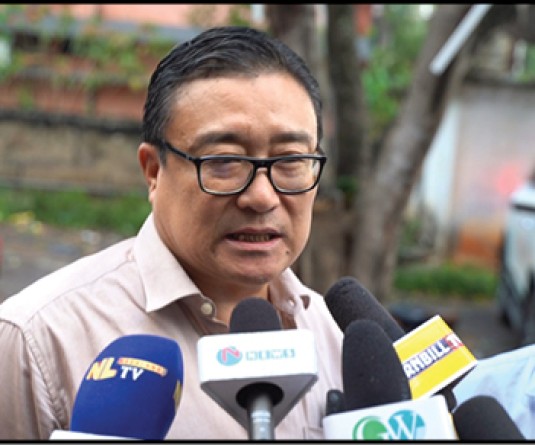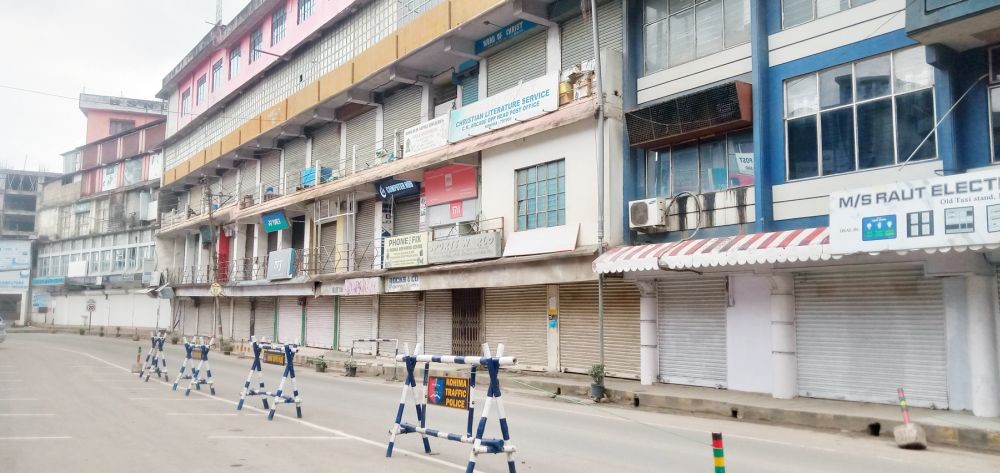
Morung Express News
Dimapur | June 28
Naga national leader Isak Chishi Swu passed away at a hospital in New Delhi on Tuesday, June 28. He was 87. The Yaruiwo (President) of the Government of the People’s Republic of Nagalim and Chairman of the National Socialist Council of Nagalim (NSCN), who was born in 1929 in Chishilimi village in Zunheboto district, is survived by his wife, six children and two grandchildren.
Swu passed away at 12:40pm at Fortis Hospital in New Delhi after fighting a kidney ailment for months. He took early education at American Mission School in Chishilimi and Government High School in Kohima. He graduated in Political Science from St. Anthony’s College in Shillong. Swu went on to become a widely respected leader who joined the Naga movement in his early 20s moved by a sense of patriotism that stayed with him till the time of his death.
Swu was the Foreign Secretary of the Naga National Council before being elevated as its Vice President in the early part of the movement. He later founded the NSCN in 1980 alongside Thuingaleng Muivah and SS Khaplang. In 1988, Swu and Muivah parted ways with Khaplang.
Patriotic, Religious, Committed
People who met him share how they remember Isak Chishi Swu
Morung Express News
Dimapur | June 28
On those he met, he left an indelible mark. Isak Chishi Swu’s openness to listen to people, his religiosity and patriotism emanated so much light, it captured the souls of those fortunate enough to have interacted with him before he took grievously ill.
A close friend was Gen. Thinoselie M. Keyho, who had spent a good number of years with Swu early on, both working with the Naga National Council. Eventually, each pursued his own way. “We had the same goal but our approach was different,” acknowledged Gen. Thinoselie, speaking to The Morung Express over the phone, expressing sadness beyond immediate loss. “He was a religious man, not a politician. Nobody can compete with him on religiosity. Isak devoted his life to his lord,” he noted with a sense of fondness of a man he last met at several meetings around the world; with whom he had once gone to several other parts of the world in pursuit of freedom.
“He has—we have—given our lives to the cause. Now it is up to the present and future generations to uphold this,” said Gen. Thinoselie.
“I feel orphaned,” stated a shaken Dr. Gina Sangkham, senior rights’ activist from Chandel, on hearing of Swu’s death on June 28. Having met him several times since the 1997 ceasefire, one of her fondest memories of Swu involved taking part in a confidence-building ‘game’ during a workshop held in Chiang Mai, Thailand. “He participated as an equal with the rest of us,” she reminisced. Despite his hard years of struggle in the Naga movement, his core remained soft—he was always “open to interactions.” For Dr. Sangkham, “we have to live by the dream he gave us.”
These dreams were focused.
“He was totally committed to the cause of self-determination of the Naga people. He never differentiated between clans and tribes. For him all Naga people were one, together they made the Naga nation,” said Tapan Kumar Bose, an activist who had worked on several initiatives to bring better understanding of the Naga movement to the Indian establishment. He met the NSCN Chairman in Bangkok in 1992 and several times after that. Bose remembers Swu as a “gentle person” who was “always ready to answer my questions,” and added, “He used to say we are fighting for our freedom and our dignity.”
“Every time we met he would stand up, hug me and say a small prayer. I will always remember his smiling face and the gentle voice,” Bose remembered.
According to Bose, Swu was a “visionary and a committed supporter of the peace process, though he was often frustrated by the delaying tactics of the Indian negotiators. He engaged in armed struggle. But he was also a man of peace. A devout Christian who abhorred violence. He was one of the main architects of the peace process and remained committed to it till the last day.”
For Khesheli Chishi, a nonviolent peace activist who has worked with the Naga Mother’s Association and is now associated with the Indigenous Women’s Forum for North East India, he was a “father figure.” Giving an example, she said, “When eating together, he would always make sure that the rest of us were well fed and he would serve us the best portions. He always saw to it that we were all well fed, not just food-wise but also spiritually.”
Till his death, Chishi noted, he was firm on reconciliation and for the Naga people to “live as a family.” Combined with his “honesty and humility,” he was a “beacon of light” for the Naga people, she maintained.
For educationist and human rights activist, PS Lorin, Swu was “a true socialist rooted in Christianity” and deeply understood the needs of the Naga people. Lorin witnessed Swu take the just path he professed. About 10 years back, when the education sector in Nagaland, particularly in Nagaland University, could not take the burden of Naga national tax, Lorin met him to explain that the University teachers be exempt from taxation.
“He carefully listened and understood that Naga people needed education the most. He immediately lifted the said taxes,” affirmed Lorin, who also described Swu as a “respectable, patriotic, understanding” man who was foremost a “believer” who always talked of “forgiveness.”
In Swu’s passing, to put it in Bose’s words, “the Naga people have lost a great leader, a visionary and crusader for justice.”
PM condoles, lauds Swu’s role in peace process
New Delhi, June 28 (IANS): Prime Minister Narendra Modi on Tuesday condoled the death of veteran Naga rebel leader Isak Chishi Swu and lauded the role of the Chairman of the National Socialist Council of Nagaland (IM) for “bringing out” the Framework Agreement for Naga peace signed between the central government and the rebel outfit. “My heartfelt condolences to the family and supporters of Mr. Isak Chishi Swu on his demise. May his soul rest in peace,” the Prime Minister tweeted. “Mr. Swu will be remembered for his historical role in bringing out the Framework Agreement for Naga peace,” he said in another tweet.
Modi also wrote on micro blogging site: “Mr. Isak Chisi Swu wished the best for the Naga people and aspired for peace.” On August 3, 2015, the central government signed the Framework Agreement with NSCN(IM).




